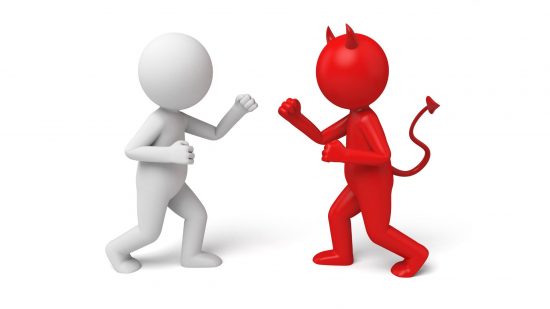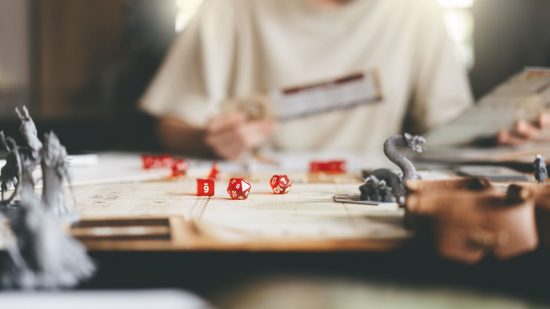Ah, DnD – great fun, super social and, as we explored in an earlier article, even a great tool for therapy. No arguments there, right? The public (and scientific) opinion of Dungeons and Dragons wasn’t always this rosy, though – once upon a time, DnD was viewed as a menace.
My name is Dr Joe, Wargamer’s Resident Psychiatrist, and today we’re going to explore the Satanic Panic, how scientists tried (and failed) to find the harm in DnD, and how we proved that playing tabletop RPGs doesn’t harm your kids. Or you.
Just don’t eat the dice.
Satanic Panic
Even the stars of Dungeons and Dragons: Honor Among Thieves were shocked to hear DnD inspired a ‘Satanic Panic’, so don’t beat yourself up if it’s news to you too! It was a wild era.
Geopolitics and the redefining of the American psyche aside, the 1980s showed a general tendency for public terror in the face of threatened corruption – and one of the many forms that took (primarily in the USA but also the UK) was a widespread fear that DnD was corrupting the youth.
At the extreme end of the phenomenon, some people were fairly convinced that DnD was leading young people into literal satanic worship. There were relatively few of these extremists, but they were the thin end of the wedge in an impressively pervasive sociocultural backlash. So many people began claiming RPGs were causing harm, so loudly, that researchers began actively investigating it.
The drivers of this (along with DnD’s part in it) have already been really well explored in this Dicebreaker piece by Olivia Kennedy, so our focus here is going to be the part science and research had to play in the panic.
See, scientists hunted pretty thoroughly for proof that DnD harms people, and – as we’ll see below – received a reassuringly empty haul for their efforts.
The hunt for harm
Now, some folks had made their mind up already – in their 1987 book ‘A Christian Response to Dungeons And Dragons’, Peter Leithart and George Grant called the game “the chief weapon used in this spiritual raid on our children”, saying it was outright dangerous; an “introduction to evil, a catechism of occultism” and “a recruiting tool of Satan”. What an advert…
That year brought some slightly more professional work too – in 1987 researchers undertook a study looking for emotional instability in players, starting out by highlighting the claim DnD was linked to suicides, homicides and promoting those acts. What did they find when they looked? Nothing. No link.
In an ideal world, scientists and their priorities should be immune to peer pressure from a public flap like the Satanic Panic, but the questions they started asking showed they were anything but. A 1991 article by Abeyta and Forest, for instance, hypothesised – based on the media portrayal at the time – that playing RPGs would be associated with increased criminality.
The paper’s opening lays out the public critique of DnD, even including the claims it was linked to emotionally unstable behaviour, suicides and homicides. It explores the foundation of the organisation ‘Bothered About Dungeons and Dragons’ (B.A.D.D.) in 1983; it examines claims that DnD lead to a breakdown of the ability to differentiate fantasy from reality; and it looks at previous academic explorations of RPG harm.
The researchers not only found no link between DnD and criminality, they actually found an increase in criminality-associated traits among people who did not play RPGs.
The paper’s authors did comment that people denouncing RPGs “have not considered the possibility that other factors besides role-playing may be involved in the expression of the criminal behaviour”, and they do really seem to have tried to explore the question impartially.
But the fact that Abeyta and Forest’s hypothesis was even accepted as a reasonable starting point demonstrates the sheer strangeness of the Satanic Panic era. For a brief few years, folks were positively obsessed with nailing DnD as the malign influence behind Satanic worship and even murder.
The Cultic Studies Journal published work in 1995 looking for a link between satanic practices and playing DnD – i.e. directly investigating the popular idea that DnD was just Satanism with a D20.
They assessed and compared multiple personality dimensions between DnD players, controls, and satanists (can you imagine the recruitment posters?) and found – drum roll please – no link. They also found:
- Significant personality differences between Satanists and players.
- No evidence whatsoever that RPGs lead to satanic practices.
A 1998 paper similarly started off from a ‘DnD harms’ standpoint, suggesting previous research showed DnD players were “less empathic and more introverted” (if you’ve read my earlier Wargamer article on DnD therapy, you already know this isn’t true; DnD players are more empathetic). The research seems to start from a view that DnD must be associated with low mood or even suicidality – but finds no link.
One paper, published in 1990, did find a negative correlation. It was a small sample size and the negative association they found was an increased sense of alienation. Amid a public primed to see DnD players as corrupted souls and devil worshippers, we probably shouldn’t be too surprised they felt a bit on their own.
Interestingly, this paper also found DnD players had fewer feelings of meaninglessness compared to non-players. Despite their alienation, the RPGers still felt a stronger sense of purpose and self-identity than their peers.
These papers all highlight the lack of evidence that DnD causes harm, but it doesn’t seem to stop detractors from hunting for it. What’s brilliant about this process, though, is that it’s inadvertently built a great body of evidence to support the conclusion that DnD doesn’t cause harm.
So what was all the fuss about, then?
We know that DnD is now used for therapy, and has brilliant effects even beyond a therapeutic space. The unproven allegations of harm even led researchers to suggest a more useful question than ‘Is DnD bad?’ might well be: ‘Why do people falsely conclude that DnD is bad?’
It’s a good question, too. Why did people feel so strongly that DnD was harmful? The authors of the 1991 paper mentioned earlier suggested the ‘availability heuristic’ likely had a part to play. This is the psychological mechanism that means more ‘available’ or memorable events (things which come more easily to mind, like vivid or shocking moments) have the illusion of occurring more often than they actually do.
It combines nastily with humans’ inherent tendency to believe statements and arguments that sound straightforward, logical, and intuitive, regardless of whether they’re true or not. The idea that playing fantasy games might make you lose touch with reality sounds half decent – until you think about it properly and realise it’s nonsensical bilge.
That gruesome twosome, working together, is what makes folks jump on simplistic, scapegoating answers to complex questions. It’s why, instead of a logical, scientifically sound answer, we frequently see some very bad ideas presented as the solution to the world’s problems.
So you can relax – DnD is great fun, Satan isn’t coming to steal your dice, and the therapeutic benefits are something to be celebrated. The hunt for harm came up short, and even managed to find some of the great things DnD can do for you.
And it’s not the only game that brought us joy this year, either – if you fancy some more optimism, celebrate the the Wargamer team’s personal games of the year with us – plus our awards for the best tabletop games of 2023, and the best videogames of 2023.
Alternatively, check out my tips for beating Warhammer hobby burnout, or how to deal with losing at Warhammer (the right way).
Source: Wargamer










